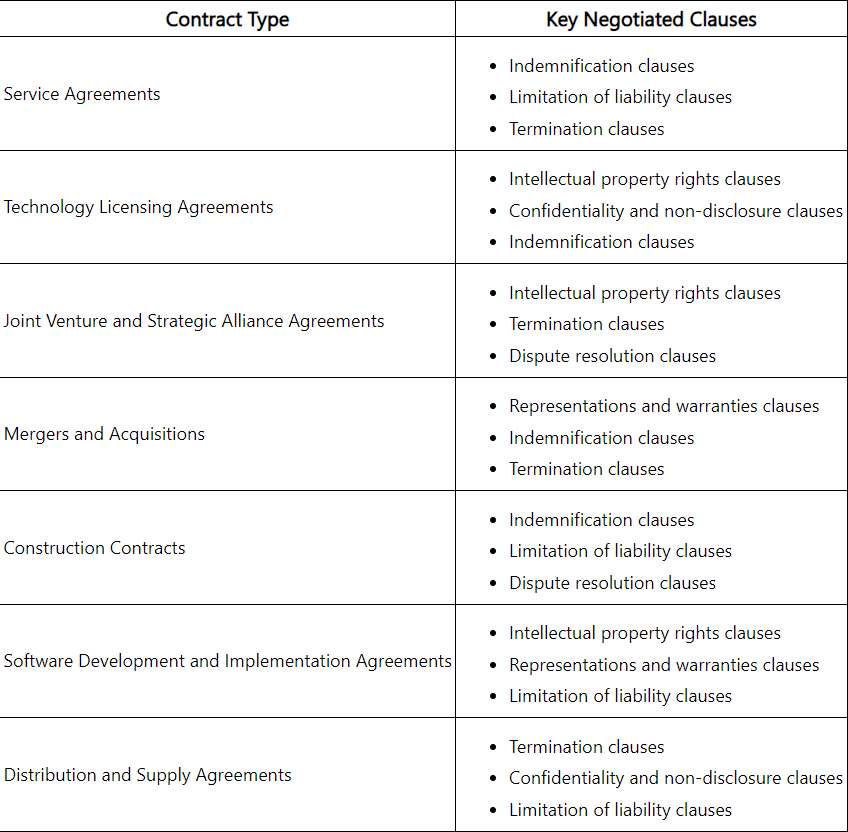
7 Most Negotiated Clauses in Commercial Contracts (and How to Master Them?)
Legal contracts are the backbone of business deals, defining each party’s rights, obligations, and risk exposures. Seasoned negotiators, especially business managers and procurement teams, know that a few critical clauses often consume the most time and attention at the bargaining table.
Why do these particular provisions spark such intense debate? The simple answer is that they allocate risk and reward between the parties.
ContractKen, as a trusted authority in contract review and AI-driven negotiation analysis, has observed first-hand how frequently these clauses become deal bottlenecks. With hundreds of contracts analyzed, our data shows these sections often undergo multiple redlines before both sides are satisfied. Fortunately, modern tools and strategies, including AI-powered contract review, clause libraries, and risk alerts, can empower your negotiation of these clauses.
Below, we delve into the seven most negotiated clauses, with practical examples of disputes and tactics, and highlight how ContractKen’s platform helps you understand, negotiate, and manage each one effectively.
We are not covering key commercial clauses like Payment terms, Pricing, Scope of work/services as those are the bedrock of any commercial negotiation and are not technically legal clauses
1. Indemnification (The "Indemnity Clause")
Indemnification clauses assign responsibility when things go wrong: one party (the indemnifier) agrees to compensate the other for losses or claims arising from certain breaches or third-party lawsuits. This clause is essentially about risk transfer, and it can carry huge financial consequences, which is why it’s often fiercely negotiated. A broad indemnity could make a vendor liable for all kinds of claims, from intellectual property infringement to personal injuries, whereas a narrow one might leave the customer exposed.
Why it’s negotiated: An indemnity clause can shift significant risk. For example, a software provider might agree to indemnify a client for any third-party IP infringement claims related to its software. The client will want that promise to be as comprehensive as possible, covering all costs, damages, and legal fees, while the provider will push to limit the scope or cap the dollar amount. If poorly negotiated, an indemnity clause can lead to multimillion-dollar exposures, or insufficient protection when a lawsuit hits. It’s not uncommon for business teams to escalate indemnity issues to legal counsel at the last minute, since the concepts are complex and high-risk. But savvy procurement professionals know to address indemnities early, ensuring everyone understands who covers what risk.
Negotiation example: Consider a procurement contract where a manufacturer supplies parts to a retailer. The retailer insists on an indemnity if any supplied part is defective and causes injury to consumers. In one real scenario, a supplier without a liability cap on their indemnity faced massive losses when a product recall led to numerous lawsuits. On the flip side, suppliers often negotiate to exclude indemnification for the buyer’s misuse of the product or for indirect damages.
A successful negotiation tactic here is to make indemnities reciprocal and specific: the supplier indemnifies the buyer for third-party injury claims caused by defects, while the buyer indemnifies the supplier for third-party claims resulting from the buyer’s own negligence. Both sides may also agree to caps or carve-outs: the indemnity applies but excludes consequential damages, or it’s capped at a certain amount tied to the contract value.
Key points often negotiated in indemnities:
- Scope of indemnification: The types of claims or losses covered. Parties debate whether it covers just third-party claims or also direct losses, and which scenarios trigger it, such as IP infringement, bodily injury, or breach of specific representations.
- Limitations or caps: Whether the indemnifying party’s total liability is capped, and whether certain damages, like consequential or punitive damages, are excluded. Many customers also negotiate that indemnity obligations sit outside the general limitation of liability cap.
- Procedures for claims: Notice requirements, who controls defense and settlement, and what happens if the indemnified party settles without consent.
How ContractKen helps: ContractKen can automatically flag broad or unusual indemnification language as a risk issue during contract review. If a draft includes an indemnity with no cap or an overly expansive scope, the AI can detect that and alert your team. ContractKen can also compare the clause against your playbook or past contracts, instantly showing deviations from your standard indemnity wording. You can then generate precise redline suggestions, shown as tracked changes, making your indemnity clause negotiation-ready quickly.
2. Intellectual Property (IP) Rights
Intellectual property rights clauses are mission-critical in technology, software, and R&D-driven contracts. These clauses determine who owns what IP and who can use it, not just now, but for years to come.
Why it’s negotiated: IP clauses have long-lasting business implications. A misstep could mean losing ownership of a valuable invention or being locked out of using something you paid to develop. In a software development agreement, the client might expect to own custom code written for them, while the developer wants to retain ownership of underlying libraries or general improvements.
Negotiation example: In a technology licensing deal, the enterprise may want to own modifications, while the vendor wants to retain ownership and grant usage rights. A common compromise is ownership plus license: the vendor retains ownership of core technology and improvements, while the customer receives a perpetual, royalty-free license to use the improvements for its internal business.
Key points often negotiated in IP clauses:
- Ownership and assignment: Who owns newly created IP versus pre-existing IP. Contracts often distinguish background IP and foreground IP.
- License scope and terms: Exclusive versus non-exclusive, territory, field-of-use limits, sublicensing rights, and fees.
- IP warranties and infringement responsibilities: Non-infringement warranties, obligations to defend or indemnify, and risk allocation for open-source components.
How ContractKen helps: ContractKen can identify deviations from standard IP allocation models by comparing a proposed clause to your playbook and your Clause Library. The platform can highlight ownership flips, narrow license grants, or missing sublicensing language, so your team can address them before they become costly mistakes.
3. Termination Clauses
Termination clauses define how and when parties can end a contract early, and what happens afterward. They are heavily negotiated because they determine flexibility, leverage, and financial exposure.
Why it’s negotiated: A supplier wants revenue certainty and fewer no-fault exit rights. A buyer wants freedom to exit if performance is poor or priorities change. This often becomes a debate around termination for convenience and the length of notice and cure periods.
Negotiation example: In a five-year outsourcing agreement, a buyer may push for termination for convenience with 60 to 90 days notice. The vendor may accept only if there is a minimum term, a termination fee, or compensation for non-cancellable costs. Another approach is performance-based termination: repeated SLA failures trigger termination rights even if no single failure is “material.”
Key points often negotiated in termination clauses:
- Grounds for termination: For cause, for convenience, insolvency, change in law, and milestone failure.
- Notice and cure periods: Timing differs by breach type, for example 10 days for non-payment and 30 days for performance breaches.
- Post-termination obligations: Refunds, payment for work performed, transition assistance, survival of confidentiality, and any termination fees.
How ContractKen helps: ContractKen flags missing termination rights, overly restrictive exit conditions, and unfavorable notice or cure changes compared to your standard. It also helps you pull fallback language from your Clause Library so negotiations keep moving.
4. Representations and Warranties
Representations and warranties are statements of fact and promises that allocate responsibility if those statements turn out to be false. They are negotiated because they create legal exposure and shape remedies.
Why it’s negotiated: The receiving party wants broad, unqualified promises. The giving party wants narrower reps with qualifiers like “to the best of our knowledge” and “in all material respects.”
Negotiation example: In a SaaS deal, a customer may ask for “error-free and uninterrupted” performance, which vendors typically reject. A pragmatic compromise is an uptime SLA with clear service credits. In higher-stakes deals, parties negotiate how long reps survive, what disclosures qualify them, and whether remedies are capped.
Key points often negotiated in reps and warranties:
- Scope and specificity: How broad the commitments are and what facts are covered.
- Qualifications: Knowledge qualifiers and materiality thresholds.
- Survival and remedies: How long reps remain actionable and whether indemnity is the exclusive remedy.
How ContractKen helps: ContractKen highlights risky qualifiers, missing warranties, and edits that dilute protections. It can also help your team quickly locate and summarize warranty commitments so business stakeholders understand the real obligations.
5. Confidentiality and Non-Disclosure
Confidentiality clauses protect sensitive information and increasingly include data protection expectations, especially where customer data or proprietary methods are involved.
Why it’s negotiated: Parties negotiate what counts as confidential, who can access it, how it can be used, and how long obligations last. Modern negotiations also address whether a party can use data for analytics, benchmarking, or improving AI systems.
Negotiation example: A discloser wants confidentiality to last indefinitely for trade secrets, while the recipient proposes a three-year term. A compromise is trade secrets protected as long as they remain trade secrets, while other information is protected for a fixed period. Another hot point is compelled disclosure: the recipient may agree to notify the discloser promptly and cooperate with protective order requests.
Key points often negotiated in confidentiality clauses:
- Definition of confidential information: Broad versus marked-only definitions, and standard exclusions.
- Permitted disclosures and use: Need-to-know access for employees and advisors, legal disclosure rules, and limits on secondary uses.
- Duration and return or destruction: How long obligations survive and what happens to materials after termination.
How ContractKen helps: ContractKen flags subtle weakening edits, such as shortened confidentiality duration, expanded carve-outs, or missing return and destruction language. It also helps ensure data protection terms align with your playbook.
6. Limitation of Liability
The limitation of liability clause caps exposure and often excludes certain categories of damages. This clause is commonly the most negotiated because it directly affects financial risk.
Why it’s negotiated: Vendors want predictability and lower caps. Buyers want higher caps and exceptions for serious issues, such as data breaches, confidentiality breaches, fraud, and IP infringement.
Negotiation example: A vendor proposes a cap equal to 12 months of fees and excludes consequential damages. The customer negotiates exceptions: uncapped liability for fraud and willful misconduct, plus a higher cap for data security incidents. A common compromise is tiered caps: one cap for general claims and a higher cap for specific risks.
Key points often negotiated in limitation of liability clauses:
- Cap amount: Fixed sum vs fees-based cap, and whether it is per incident or aggregate.
- Excluded damages: Indirect, special, consequential, and punitive damages, plus how “lost data” is treated.
- Exceptions: Fraud, willful misconduct, gross negligence, confidentiality breaches, data protection breaches, and indemnity obligations.
How ContractKen helps: ContractKen extracts and highlights caps and exclusions so they are impossible to miss, flags missing limitation clauses, and compares edits against your standards. It can also suggest redline language for carve-outs and tiered caps based on your Clause Library.
7. Governing Law and Dispute Resolution
Governing law sets which jurisdiction’s laws apply. Dispute resolution determines how and where disputes are resolved, such as litigation, arbitration, or staged escalation.
Why it’s negotiated: Parties want home advantage, familiar laws, and reasonable cost of enforcement. International deals often compromise with neutral law and arbitration for enforceability and predictability.
Negotiation example: A buyer wants local courts. A vendor insists on arbitration in a neutral city. A practical solution is arbitration with a clear seat, one arbitrator for smaller disputes, three for large disputes, and a requirement to attempt executive escalation before filing.
Key points often negotiated in governing law and dispute resolution:
- Choice of law: Home jurisdiction vs neutral law.
- Mechanism: Litigation vs arbitration vs mediation or escalation steps.
- Venue: Courts or arbitral seat, language, and enforceability considerations.
How ContractKen helps: ContractKen highlights the governing law, venue, and mechanism so your team can assess whether it matches policy and risk tolerance. It also flags missing clauses and unusual additions like fee-shifting provisions.
Context Matters: Different Contracts, Different Priorities
These seven clauses are common negotiation hotspots, but their importance shifts by contract type. Service agreements often focus on indemnity, liability limits, and termination rights. Tech and SaaS agreements elevate IP, confidentiality, and data protection. Partnerships and joint ventures focus on IP, exit rights, and dispute resolution. The key is to match negotiation intensity to the real business risks of the deal.

Conclusion and Key Takeaways
Negotiating these seven clauses is both an art and a science. They shape financial exposure, ownership of critical assets, operational flexibility, and how disputes play out.
Key takeaways:
- Prioritize and plan: Identify your top risks for this specific deal and prepare fallback language.
- Be persuasive and reasonable: Anchor positions in practical risk scenarios and market norms.
- Use technology and data: AI tools like ContractKen improve speed, consistency, and risk visibility.
- Continuously improve: Track which clauses get negotiated most and refine templates and playbooks accordingly.
ContractKen is built to help you negotiate faster and smarter: AI-powered clause identification, playbook-based risk alerts, precedent comparisons, and negotiation-ready redline suggestions that keep deals moving without losing control of risk.
Sources for more reading on this topic:
- "Drafting and Negotiating Commercial Contracts" by Mark Anderson and Victor Warner (Aspen Publishers)
- "The Negotiation Book" by Steve Gates (John Wiley & Sons)
- "Negotiating Commercial Contracts: Analysis and Writing Practice" by Paul J. Zwier (Carolina Academic Press)
- "The Harvard Negotiation Project" (Harvard Law School)
- "The Negotiation Experts" (online resource and training platform)
through AI
Review & mark-up third party drafts, compare redlined drafts with ease and create new drafts using your own precedents.
Built-in, industry leading 'Moderation Layer' to preserve the privacy and confidentiality of contract data.





.avif)


